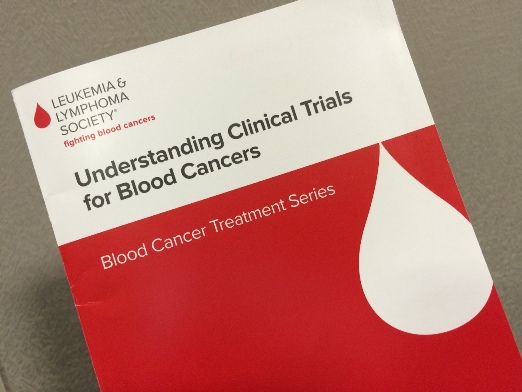 Because it can take up to 15 years for a new blood cancer drug to be studied and made available for doctors to prescribe, some patients opt for clinical trials as a way to gain early access to a promising treatment.
Because it can take up to 15 years for a new blood cancer drug to be studied and made available for doctors to prescribe, some patients opt for clinical trials as a way to gain early access to a promising treatment.
Advancing new cancer therapies requires years of extensive clinical investigation, but clinical trials come with no guarantees.
"A drug is allowed to enter the clinical trial phase based on scientific evidence including cell and animal studies, but it's still considered experimental and unproven. We don't know if it's more effective or safer than the standard treatment until the results of clinical trial are in," said Peg McCormick, R.N., clinical trial specialist for The Leukemia & Lymphoma Society.
A clinical trial is a carefully controlled research study conducted by doctors to determine safety and efficacy of an experimental treatment and to learn if the treatment increases survival and/or quality of life. A treatment that is proven safe and effective in a clinical trial often goes on to be approved by the U.S. Food and Drug Administration (FDA).
Some patients choose to join a trial because the experimental treatment may offer better efficacy than standard treatments for their particular diagnosis or they aren't willing or able to undergo a recommended procedure (such as a transplant). Stage of life can also be a factor.
Many people think of clinical trials as a last-resort option once standard treatment fails and this is often the case. But there are many trials available for newly diagnosed or earlier stage disease. For example, a trial may be conducted aimed at decreasing the incidence of graft-versus-host disease, a complication of certain stem cell transplants. Another trial may test adding another drug to a standard treatment to see if the combination improves the outcome.
People who call LLS’s Information Resource Center often end up talking with McCormick, who stresses that her role is not to convince people to enter clinical trials. "I’m here to educate callers about clinical trials and to provide a balanced view of this option for treatment."
She takes into account the specifics of their diagnosis, overall health status, ability to travel for treatment, insurance restrictions, support systems and their reasons for wanting to pursue a clinical trial to identify which ones they might qualify for. She conducts searches and helps develop a list of questions to ask a doctor about participating in a particular trial. Sometimes she'll call a trial site to pre-qualify a candidate or seek to obtain a non-approved drug on a compassionate use basis.
Clinical trials involve four phases. In Phase 1, researchers test a drug on a small group of people to evaluate safety and determine the appropriate dose. Phase 2 involves using a larger group of patients to see how well it works as well as continue evaluating safety. In phase 1 and 2 trials, all participants receive the experimental treatment. Phase 3 trials for cancer patients usually compare the outcome of a group of patients receiving standard treatment to a similar group receiving the experimental treatment. Patients do not get to choose which treatment they will receive but everyone receives at least the standard treatment. It is important to note that no placebos are used in cancer clinical trials. Phase 4 trials involve drugs that have already been approved by the FDA and are being tested in another patient population.
"Looking at trials isn't a scary place to be. It's a powerful place if you have the information you need," McCormick said.
Read "Dispelling Misunderstandings About Clinical Trials."
To talk about clinical trials, conduct a search, or receive an information booklet, call the Information Research Center at (800) 955-4572 or click here to send an email.
